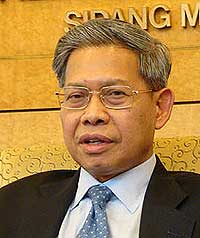The International Trade and Industry Ministry (Miti) has yet to receive any proposal from Kuokuang Petrochemical Technology Co of Taiwan, which is said to want to set up a petrochemical plant in Malaysia.
 The minister, Mustapa Mohamed, confirmed that the Malaysian Industrial Development Authority (Mida) has not received any formal application from the company.
The minister, Mustapa Mohamed, confirmed that the Malaysian Industrial Development Authority (Mida) has not received any formal application from the company.
"No application has been submitted to Mida on this project," he replied to a query by text-message.
"When there is an application, Mida will consider the merits of the project very carefully. Environmental considerations are very important and every project needs the approval of the Department of Environment."
The Taiwanese have been objecting strongly over the past few months to the company’s plan to build an oil refinery and naphtha cracking plant in the Dacheng Wetlands in Changhua County.
Taiwanese state-run oil refiner CPC Corp holds a 43 percent stake in Kuokuang Petrochemical.
Critics said the costs would outweigh the benefits, in addition to damaging the oyster and eel farming industries and a zone inhabited by the Chinese white dolphin that is fast becoming extinct. The plant would also pose a serious threat to human health.
Taiwan Economics Minister Shih Yen-shiang had recently raised the possibility of Kuokuang moving the project to either Malaysia or Indonesia.
A previous news report had quoted Miti deputy minister Mukhriz Mahathir as saying that the ministry would welcome the investment.
Mukhriz also said the ministry would assess the project and would provide incentives if it could be beneficial to Malaysia.
NGO opposes ‘dirty factories’
Penang-based NGO Sahabat Alam Malaysia said it will track the company’s background should the government allow the project to be implemented in Malaysia.
Secretary
 Meena Raman also said it would be unacceptable to allow Kuokuang to relocate the plant to Malaysia when it faces objections at home.
Meena Raman also said it would be unacceptable to allow Kuokuang to relocate the plant to Malaysia when it faces objections at home.
"We don't want a dangerous industry to come into Malaysia," she said when contacted.
Giving an example of the problems caused by the Mitsubishi rare earth plant in Bukit Merah, Perak, in the 1980s, Meena said Mitsubishi was willing invest at Malaysia because of lax enforcement of environmental issues.
The plant closed in 1994 after years of protests from residents, as well as evidence provided on the health hazards caused by toxic radioactive toxic wastes dumped by the plant.
"We reject dirty factories. Every life is equal... it doesn't mean that the lives of the Japanese and the Taiwanese are more important that the safety of Malaysians," Meena said.
Tan Ka Kheng, a professor in a private college, said he would not object to Kuokuang Petrochemical operating in Malaysia as long as the government ensures that the plant operates under stringent environmental safety conditions.
However, he also pledged support for the rights of residents if there is any concern over health problems due to the project.




